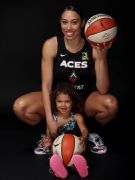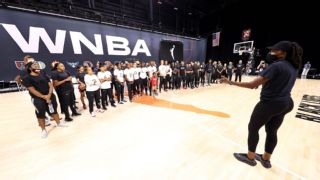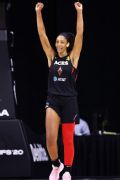|
Before celebrating its 25th anniversary season, which tips off Friday, the WNBA and its 144 players had to navigate the most unusual season in their quarter-century history. In 2020, the coronavirus pandemic forced players (some with family), coaches and support staff into a bubble in Bradenton, Florida. Isolated but not sheltered, 144 players protested in unison after the shooting of Jacob Blake. They underwent daily testing for coronavirus. They practiced and they played. As depicted in ESPN Films' "144," which debuts Thursday (9 p.m. ET, ESPN and available immediately after on ESPN+) the challenges were both physical and mental. A'ja Wilson, the league's reigning MVP; Dearica Hamby, the mother of a then-3-year-old daughter; and Nneka Ogwumike, the president of the executive committee of the Women's National Basketball Players Association, reflect on the challenges they overcame and the lessons they learned before, during and after their nearly 100 days inside the "Wubble." Dearica Hamby: 'The days went on forever' Amaya has been on the move since she was born. She hasn't lived much life -- she's 4 years old -- so she doesn't know anything different. She's lived out of a suitcase just like I have. The only thing I can guarantee is that, no matter where we are, we can sleep in a bed together. It's kind of a comfort thing for both of us. My bed is huge, a King XL, but no matter what, she's literally on top of me, and I'm at the edge. Just about every night I ask her to give me a foot of space and she says, "But I love you so much," and cuddles me closer. I think, "Oh no, I've created a monster." It's hard to create balance when you're on the go so much and want to give your kid some sort of familiarity and routine. For the bubble, I packed her clothes, toys, different kinds of food and snacks. I brought her scooter, her skates, her basketball goal and some books that she enjoys. I also brought her grandma. My mom is a lifesaver. She carried a lot of the load for me. She does every season. In Bradenton, we had a kitchen area, living room and two bedrooms on opposite sides. My schedule was pretty consistent, and even though practices were long, it seemed the days went on forever. There was no escape from this basketball bubble. There were some days I didn't leave my room. I was just exhausted. Things I could've normally done to "escape," I couldn't do in the bubble. In a normal situation, after a rough game, you could go to dinner with family and friends or you could just lay out in the comfort of your own home. But in the bubble, you'd go outside and you'd see refs or you'd see DT [Diana Taurasi] and Brittney Griner in the hallway after you got beat by 20. Not to mention you had to possibly share your housing with a teammate. You couldn't just go home and be frustrated without locking yourself in your room. And personally I for sure couldn't take those frustrations back to Amaya. Parenting is the most important thing to me. I'm not perfect, and some days I don't have it, but I do my best to create a safe environment for my daughter. I want to show her how to be self-aware so she can navigate situations differently than the way I have. I've always been kind of clingy to my mom. My mom and I were very close when I grew up. It was just me and her for a bit of time. It has for sure influenced the way I am with Amaya. Doesn't make it wrong, and it's nothing against my mom; she loved me unconditionally. I wouldn't change a thing about the way she raised me. The bubble was an eye-opener for me. Before the bubble I never thought of myself as someone who struggled with mental health. I also never had enough time to sit with myself and only myself, so maybe I wasn't aware. There are soooooo many subconscious thoughts and fears that are dictating a lot of your decisions without you even realizing it. I'm trying to navigate having a healthy balance. How to love without ego or projecting fear. For myself ... but also for Amaya. -- As told to Elizabeth Merrill Nneka Ogwumike: 'There was nowhere for me to just chill' The blurred vision is what scared me the most. I had never dealt with migraines before, but last year in the bubble, it hit me at postseason time. A seven-day migraine kept me out of the Sparks' second-round playoff loss to Connecticut. That was at the end of a season in which I realized, all too late, that you can't really pour from an empty cup. When I was first elected the union president in October 2016, it's like I had to learn how to ride a bike. Just when I really had the hang of it and felt comfortable, I was hit with this crazy, crazy marathon in 2020. A lot was going on with everyone last year, and I wanted to be the support for helping things to go smoothly. But I wasn't getting the rest that I needed, physically or mentally. When I wasn't playing or practicing, I was on Zooms, in meetings, fielding calls from players. Which I truly love to do. But being in a bubble situation certainly compounded what being confined was. We were experiencing so much with the pandemic and racial injustice, it felt like even in my sleep, there was nowhere for me to just chill. On Aug. 23, Jacob Blake was shot by police in Kenosha, Wisconsin, and the sports world reacted. My role was discussing it with our players, making sure everyone understood our options. We postponed WNBA games on Aug. 26-27 in protest. The league returned to action Aug. 28. The Sparks defeated Connecticut; I played 34 minutes and scored 17 points. But against Atlanta on Aug. 30, I had to leave the game when my back locked up. I missed the next three games as well. I realized all my stress had gone to my back. I had not been hit there or fallen wrong or anything. It was like my body was forcing me to rest and just trying to protect me, because I wasn't necessarily doing a good job of that. Looking back, I know those days of us sitting out the games in protest -- and the tragic reasons why we needed to do that -- really got to me. Emotionally, there wasn't any way up for me after that. Still, I returned to play Sept. 6 and finished out the regular season, getting 24 points in 37 minutes -- both season highs -- in the finale Sept. 12. But five days later for our playoff game, I was in the midst of the monster migraine. I couldn't sleep well, my vision was blurry -- that had never happened before, and it freaked me out -- and I just felt nauseous all the time. As an athlete, you have high pain tolerance. But I really hadn't taken into account my mental health, a big reason why the migraine started and became more persistent. It actually had been a resolution of mine going into 2020 to get a therapist. When the pandemic hit, I was so busy I never did it. But as soon as I got out of the bubble, I found a therapist. That was probably one of the biggest self-care moments for me. I really wish that it didn't seem like it was a "luxury" for a lot of people. There is strength in seeking help. Knowing that you don't know everything, that you don't always have the answer, and seeking those who can help you at least find your way. That's what I realized when I started going to therapy: understanding that it's OK not being OK, and that there are resources to help get on the other side of that. -- As told to Mechelle Voepel A'ja Wilson: 'I'm just trying to flourish' When we were leaving the bubble, I was excited to get back home and be free. I didn't have anyone in there with me, so I was just excited to get out and see my puppies and my family. You're still thinking about how you can be different next year; that was in the back of my mind. But in the forefront, I was just making sure I can get out, make it home safely, and try to get back to my normal life. When I got home to Las Vegas, it was probably tougher than I thought it would be. It seemed like the world had changed a little bit. I just didn't feel like myself. I was always anxious; I was always on pins and needles. I felt like I was missing out on something or I wasn't doing enough. I'd never felt this way before. I kind of felt bad because I wanted to enjoy the outside. I was so ready to get back to my life. I took a vacation with my family, and that's when it really hit me: Something was really wrong. This wasn't something that was an ordinary thing I'm going to work my way through. I started having panic attacks that shook my whole world. As an athlete, and a woman, we have to be in control of what's going on around us. When it comes to something like that, you really can't control it. You can't control your body movements; you can't control yourself. It made me come to grips with what was wrong with me. I knew I really needed help. That's when Laura Ramus, our trainer, put me in contact with a therapist, and she really helped me with a lot of different things. She was a non-biased ear, someone I could talk to who didn't know who I was. She just kind of knew what I did for a living. It allowed me to spill out everything that's going on, and she helped me put it into perspective. She didn't feel sorry for me. I'm still grieving over my grandmother's death in 2016. It was always there, but I had an outlet that I could turn to that kept my mind off of it. When you're in the bubble, you don't have any outlets. That's what got to me. I battled with a lot of self-neglect. I always tried to please everyone and tried to do everything for everybody and you just cannot do that. I gave up on myself. And I absolutely hated that feeling. I will never go down that road again. I think in the Black community, there's a huge stigma there as far as seeking help because it looks as if there's something wrong with you, or you're just having a bad day. But it's so much deeper than that. I know. I've seen it from my friends. They turn their heads, or they turn the other way because they're like, "Oh no, there's nothing wrong with me. I don't need to speak to anybody." But in actuality, it's not that there's something wrong with you, it's just seeking help from a different person listening to you and not always trying to give you the benefit of the doubt, being real with you, giving a better understanding of what's going on with your mind. Right now I feel better than I've ever felt in my professional career. I'm so in love with who I am and where I am right now in my life. I'm just trying to flourish and be the best teammate and the best person I can without losing myself. -- As told to Elizabeth Merrill
|
